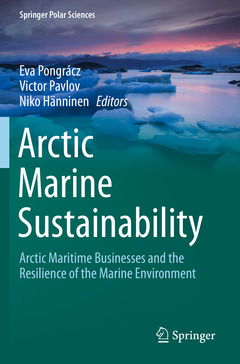Description
Arctic Marine Sustainability, 1st ed. 2020
Arctic Maritime Businesses and the Resilience of the Marine Environment
Springer Polar Sciences Series
Coordinators: Pongrácz Eva, Pavlov Victor, Hänninen Niko
Language: English
Subjects for Arctic Marine Sustainability:
Publication date: 08-2021
489 p. · 15.5x23.5 cm · Paperback
Publication date: 03-2020
489 p. · 15.5x23.5 cm · Hardback
Description
/li>Contents
/li>Biography
/li>Comment
/li>
This book presents the latest scientific views on resource use conflicts in the Arctic seas. The main areas of focus are the biological resources of Arctic seas vs. exploitation of oil and gas resources, and the conflicts in between. In addition, climate change is presented as a stressor, which both limits and facilitates the economic availability of resources in the Arctic.
The book is divided into five parts. Part 1 examines Arctic ecosystems, resilience of the marine environment and possible conflicts between industrial sector and biological world. The focus of Part 2 is on transport infrastructure along the northern routes. Issues such as Arctic maritime operations, black carbon and unmanned aerial vehicles are considered. Part 3 focuses on resource use conflicts in Arctic seas and on the most recent threats in terms of Arctic oil and gas exploration, offshore logistics operations as well as transportation of oil and oil products. Discussions in Part 4 of the book are concentrated around social aspects and involvement of local communities. Tourism development, preservation of indigenous culture, engagement of communities on relevant Arctic issues, search and rescue in the cold marine environment are examples of questions raised. The book reviews Arctic-specific petroleum regulations, the state of preparedness to oil spill accidents in the region as well as the latest developments in oil spill response technologies and their limitations. Search and rescue operations are reviewed and how working in this harsh Arctic environment affects the ability of rescue technicians to perform the required technical skills. Part 5 considers the sustainability challenges arising from the marine resource exploitation. The focus is on the vulnerability of Arctic ecosystems to disturbance ? both natural and anthropogenic.
Eva Pongrácz
Eva Pongrácz is Professor of Energy Systems and Environmental Engineering in the Water, Energy and Environmental Engineering (WE3) research unit of the Faculty of Technology. She is an environmental engineer with a keen interest of progressing sustainable development. Her research focus is in energy transition and circular economy, with a special attention on arctic issues. She is also leading research into smart energy systems, renewable energy, decarbonization and critical material recycling. She has an extensive collaboration network and project experience across the Northern Periphery and Arctic region, promoting environmental protection, decentralized energy solutions and sustainable regional development.
Victor Pavlov
Victor Pavlov is a PhD candidate at the WE3 research unit at the University of Oulu. He has been educated at four northern universities: University of Oulu (Finland), The Arctic University of Norway (Tromsø), The University Centre of Svalbard (Norway), and Murmansk State Technical University (Russia). His main research topic is sustainability of marine oil spill response methods, focusing on applications in the Arctic Ocean. He is currently researcher and responsible for communications in the 3-year APP4SEA project (Arctic Preparedness Platform for Oil Spill and Other Environmental Accidents), funded by Northern Periphery and Arctic Programme (2014-2020).
Niko Hänninen
Niko Hänninen graduated from University of Oulu (Finland) with a licentiate degree in history, but for the past 15 years he has been serving his alma mater in the field of environmental engineering. He has gathered extensive experience from development and cooperation projects in the Barents and Northern Periphery and Arctic region, which have covered various fields from Green cities to Renewable energy and Arctic oil spill response preparedness. He works as a project manager at the WE3 research unit a
Places resource use conflict in an Arctic context (fishing vs. oil & gas exploration and marine transportation)
Discusses ecological and socioeconomic impacts of oil spills in Arctic seas
Covers oil spill response preparedness and vulnerability in the Arctic




